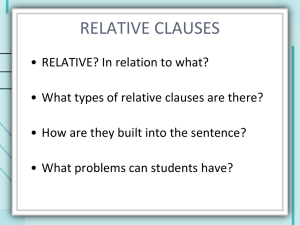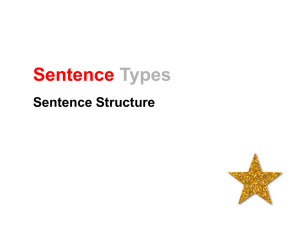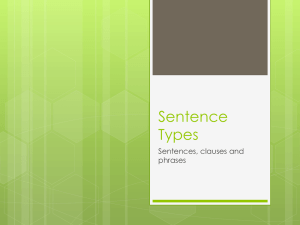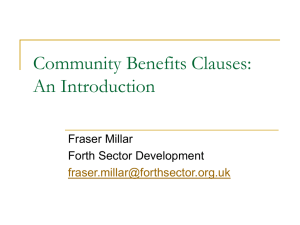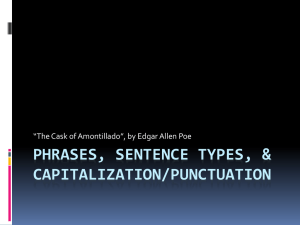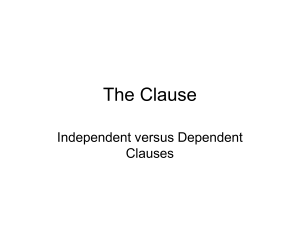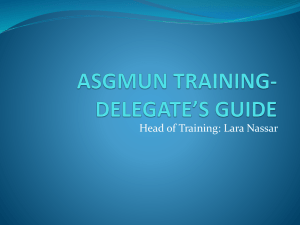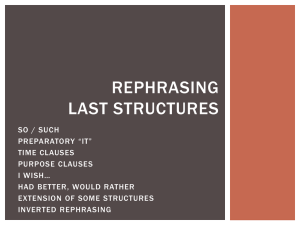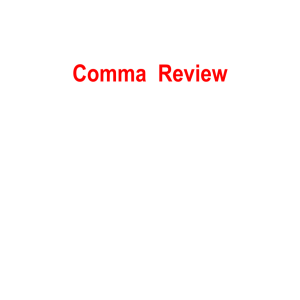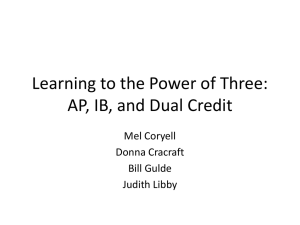Sentence Clarity
advertisement
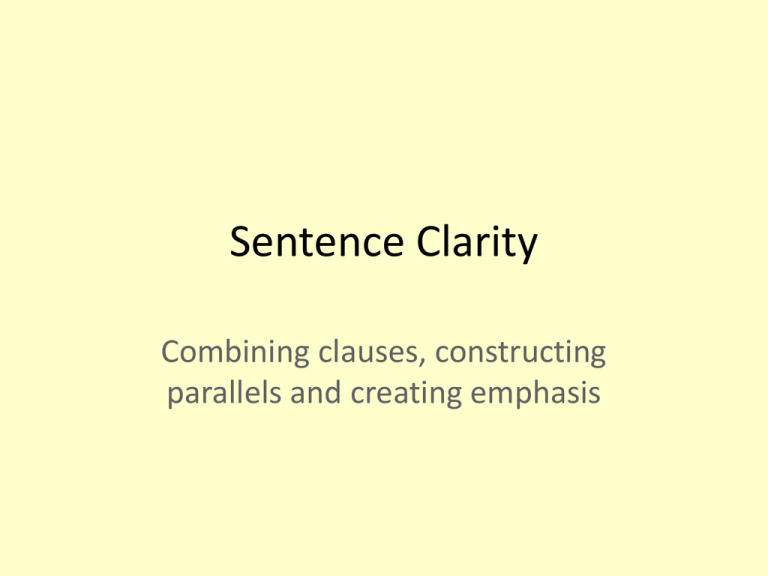
Sentence Clarity Combining clauses, constructing parallels and creating emphasis Combining Clauses Combining Clauses: Paragraph Example • I was walking to my house. It was dark. There was rain. I was cold. I heard a noise. I looked behind me. There was a huge man. He had a gun. I started to run. Was he following me? I looked back. I noticed that it was not a gun. He was holding a cell phone. Combining Clauses: Paragraph Example • I was walking to my house. It was dark. There was rain. I heard a noise. I looked behind me. There was a huge man. He had a gun. I started to run. Was he following me? I looked back. I noticed that it was not a gun. He was holding a cell phone. • I was walking to my house on a dark and rainy night. I was already nervous about the situation when I heard a noise. I looked behind me and saw a huge man. In his hand, I saw the dark glisten of a gun. Without thinking, I started to run. Out of curiosity, I looked back to see if he was catching up to me. It was then I noticed that he was not holding a gun, but a cell phone. Combining Clauses • Why combine clauses? – Tiresome and repetitive if not – More fluid reading – Varying sentence length is more interesting for reader – Allows room for better expression Combining Clauses • What is a clause? – Independent clauses can stand alone in a sentence • ex. The window is open. – Dependent clauses cannot stand alone in a sentence • ex. Because the window is open, we should be quite. Combining Clauses: How • How to combine them? – Make a compound sentence – Make a complex sentence – Combine facts to describe Combining Clauses: How – Make a compound sentence by combining two independent clauses with a coordinating conjunction (and, but, or, nor, yet, for, so) • Compound Ex. Occasionally it rains in Blagoevgrad, and the path to Kauflands turns to mud. Combining Clauses: How – Make a complex sentence by combining both independent clauses and recasting one of those independent clause as a dependent clause • Dependent clauses usually start with after, because, before, if, since, though, unless, until, when, where, while, who, which, that. • Complex Ex. When it rains in Blagoevgrad, the path to Kauflands turns to mud. Combining Clauses: How – Combine facts in independent clauses to describe • Descriptive Ex. It was a dark and stormy night. • As opposed to: It was night. It was dark. It was stormy. Combining Clauses Problem: Martin was a disrespectful boy. Dr. Black tried her best to help him. He drove many professors crazy. Combining Clauses Problem: Martin was a disrespectful boy. Dr. Black tried her best to help him. He drove many professors crazy. Compound sentence: Dr. Black tried her best to help Martin, but he was a disrespectful boy. He drove many professors crazy. Complex sentence: Dr. Black tried her best to help Martin, but he was a disrespectful boy who drove many professors crazy. Combining Clauses Problem: I live in Skaptopara. I have no privacy. I have two roommates. My roommates do not leave me alone. I wish I was at home. Combining Clauses Problem: I live in Skaptopara. I have no privacy. I have two roommates. My roommates do not leave me alone. I wish I was at home. Complex and Compound: Because I live in Skaptopara, I have very little privacy. My roommates do not leave me alone, and I often wish I was at home. Combining Clauses Problem: My sister is tall. She is skinny. She has wavy hair. Her hair is long. I have always been jealous of her. She looks like a Barbie Doll. Combining Clauses Problem: My sister is tall. She is skinny. She has wavy hair. Her hair is long. I have always been jealous of her. She looks like a Barbie Doll. Descriptive: My sister is tall and skinny. She has long, wavy hair. I have always been jealous of her Barbie Doll looks. Parallel Grammatical Form Parallel Form: Example • The duties of the job include child-care, keeping the house clean, and preparation of meals. Parallel Form: Example • The duties of the job include child-care, keeping the house clean, and preparation of meals. • The duties of the job include watching the children, cleaning the house, and preparing the meals. Parallel Form • Why use parallel form? – It offers clarity – When used sparingly in a paragraph, it can highlight a sentence as being important – It can emphasize a main point in a sequence or list when positioned the end of the paralleled segment – It can make writing more elegant Parallel Form • Where to use parallel form? – In lists, outlines, headings, or a series • Series Ex. The children ran down the hill, skipped over the lawn, and jumped into the swimming pool. – With pairs • Pairs Ex. Writers are often more interesting on the page than in the flesh. Parallel Form: Rules • When two ideas are compared, contrasted, or otherwise paired in the same sentence, they will often appear on either side of and, but, or, nor, for, so, yet – Ex. We performed whenever people would listen and wherever they would pay. – Ex. Consult a friend who is in your class or who is good at math. Parallel Form: Rules • When two ideas are compared, contrasted, or otherwise paired in the same sentence, they can also appear after each part of both…and either…or neither…nor not only…but also whether…or just as… so – Ex. I not only wanted to go away to school but also to live in Bulgaria. – Ex. The organization provided both scholarships for young artists and grants for established ones. Parallel Form: Rules • Use balanced structure in parallel form – Ex. Noun and Adjective • He was admired for his athletic physique, charming presence, and sharp wit. • He was admired for his athletic physique, charming presence, and sharp wit. • He was admired for his athletic physique, charming presence, and sharp wit. Parallel Form: Rules • Use balanced structure in parallel form – Ex. Verb and Adverb • The bird flew gracefully, sang sweetly, but left quickly. • The bird flew gracefully, sang sweetly, but left quickly. • The bird flew gracefully, sang sweetly, but left quickly. Parallel Form: Rules • Include all necessary words – We’ll move to a town near the ocean or the mountains. • Readers may wonder: Do you want a town near to the mountains or do you want to move to the mountains? – We’ll move to a town near the ocean or to the mountains. – We’ll move to a town near the ocean or near the mountains. Parallel Form: Rules • Include all necessary words – I had never before and would never again see such a sight. • The paralleling segments both use the verb “see” – I had never before and would never again see such a sight. • “had see” is incorrect. “Had seen” is correct. – I had never before seen and would never again see such a sight. Parallel Form: Rules • Include all necessary words – I prefer the beaches in Bulgaria to the United States • Are we comparing a beach and a country? Or beaches and beaches? – I prefer the beaches in Bulgaria to those in the United States Parallel Form Problem: Democracy is government of the people, coming from the people, and which serves the people too. List: Democracy is government of the people, by the people, and for the people. Parallel Form Problem: He explained the operations of the computer and how much it cost. Pair: He explained the operations and the cost of the computer. Parallel Form Problem: She is a good student, a talented athlete, and as a friend, she is loyal. List: She is a good student, a talented athlete, and a loyal friend. Parallel Form Problem: She is not only a convincing actor but also brilliant both as a director and writer. Pair: She is not only a convincing actor but also a brilliant director and writer. or: Pair: She is brilliant both as a director and a writer. Emphasizing the Most Important Idea Emphasis: Example • Nancy Kerrigan went on to receive the silver medal in figure skating at the 1994 Winter Olympics, despite the negative media. Emphasis: Example • Nancy Kerrigan went on to receive the silver medal in figure skating at the 1994 Winter Olympics, despite the negative media. • Despite the negative media, Nancy Kerrigan received the silver metal in figure skating at the 1994 Winter Olympics. Emphasis: How • Ways to emphasize? – Using final independent clause • Because we tend to remember the last thing we hear, key information should be located in final independent clause – Ex: To protect her skin, she took plenty of sunscreen. – Using climatic order • When presenting a list of ideas, arrange them in order of increasing importance – Ex: Soap operas offend our ears, assault our eyes, and damage our brains. Emphasis: Rules for Closing Position • Identify the important words – Also notable is the image of the rose throughout the story. • Arrange important information in Independent clause – …The image of the rose is notable • Arrange unimportant information in dependent clause – Throughout the story, … Throughout the story, the image of the rose is notable. Emphasis: Rules for Climatic Order • In the list, identify the object of highest order or the most important information – All class activities, whether homework, exams, or quizzes, must be graded fairly. • Arrange the list so that the object of highest order or the most important information comes last – All class activities, whether homework, quizzes, or exams, must be graded fairly. Emphasis Problem: Some foods or vitamins may make you sick, so read all labels carefully. Final clause: Read all labels carefully as some foods or vitamins may make you sick. Emphasis Problem: Some side effects of studying too hard include death, exhaustion, and headaches. Climatic Order: Some side effects of studying too hard include exhaustion, headaches, and death. Emphasis Problem: She gave $500,000 to the Eng 101 party fund last month. Final Clause: Last month, she gave the Eng 101 party fund $500,000. Emphasis Problem: Victorian women were warned that if they smoked, they would become sterile, grow a mustache, or contract tuberculosis. Climatic Order: Victorian women were warned that if they smoked, they would contract tuberculosis, become sterile, or grow a mustache. Congrats! You can now combine clauses, form parallel ideas, and emphasize points. Go forth and write with clarity!

